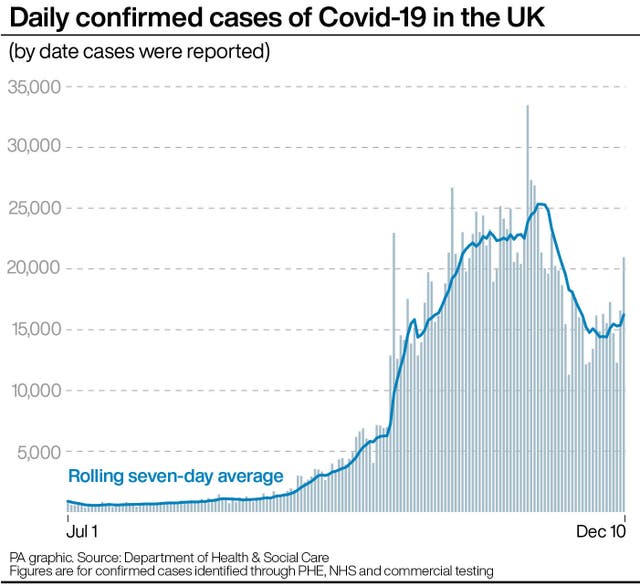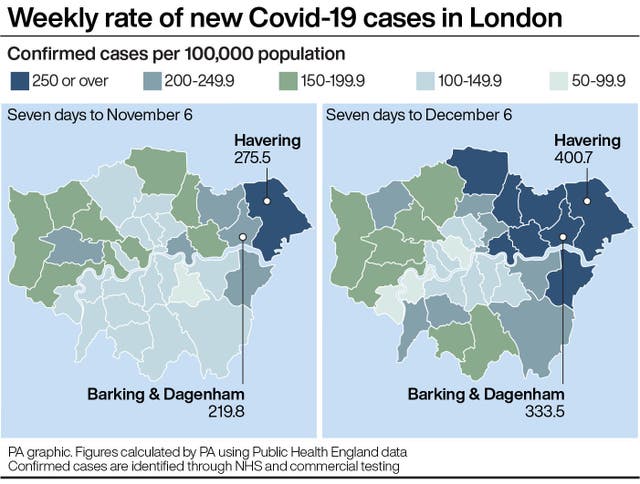Secondary school-age children in the worst affected parts of England are to be tested for coronavirus in a bid to bring down “worrying” rates of infection, the Health Secretary has said.
In a Downing Street briefing, Matt Hancock said he was concerned about London, Kent and Essex in particular, and immediate action was needed rather than waiting for a review of current rules on December 16.
It comes after London Mayor Sadiq Khan said the harshest Tier 3 coronavirus restrictions would be “catastrophic” for the capital.
Public Health England (PHE) data analysed by the PA news agency shows case rates are currently rising in a majority of local areas in England, including 31 of 32 London boroughs.
The weekly rate of new Covid-19 cases in the London borough of Havering has risen above 400 cases per 100,000 people, making it one of the highest rates in England.
A total of 1,040 new cases were recorded in Havering in the seven days to December 6 – the equivalent of 400.7 cases per 100,000.
This is up from 753 new cases in the previous seven days, or 290.1 per 100,000.
Havering now has the eighth highest rate of any local authority area in England.
Along with Havering, three other London boroughs are now among the top 20 highest rates in England: Barking & Dagenham (333.5, up from 268.7); Waltham Forest (327.1, up from 214.5); and Redbridge (310.3, up from 308.3).

Mr Hancock told the briefing: “I’m particularly concerned about the number of cases in London, Kent and Essex.
“Cases are rising and in many areas are already high.
“Looking into the detail, the testing results and survey shows us that by far the fastest rise is among secondary school-age children, 11 to 18-years-old, while the rate among adults in London is broadly flat.
“But we know from experience that a sharp rise in cases in younger people can lead to a rise among more vulnerable age groups later.
“We need to do everything we can to stop the spread among school-age children in London right now – we must not wait until the review, which will take place on December 16. We need to take targeted action immediately.”

Mr Hancock said he had spoken to the leaders of London’s councils and the London Mayor, and they had “decided to put in place an immediate plan for testing all secondary school-aged children in the seven worst affected boroughs of London, in parts of Essex that border London and parts of Kent”.
He added: “We want to keep schools open because that is both right for education and for public health.
“We are therefore surging mobile testing units and will be working with schools and local authorities to encourage these children and their families to get tested over the coming days.”
He said everyone in these groups should get tested irrespective of whether they have symptoms, adding that one in three Covid-19 cases are asymptomatic.
England’s chief medical officer Professor Chris Whitty told the briefing a third wave was “not inevitable” and people could work together to follow the rules and bring infection rates down.
But he warned that people must be “very, very sensible” over Christmas during a highly risky period for coronavirus.
He said “A third wave is not inevitable.
“But the way we prevent it is everybody, all of us, coming together and deciding we want to try and stick to the guidance that’s there.
“And accept that Christmas is a period when we can do things, that’s the reason why the rules are being relaxed, but that doesn’t mean we should do things.
“People should really be very, very sensible over that period and over this whole period of risk because this is a very risky period for us.
“But it’s definitely not inevitable that things will get substantially worse, that’s something we all need to work together on.”
Prof Whitty said that if vaccines reduce transmission of the virus between people as is expected, then the country “will walk backwards” from restrictions, possibly at different speeds in different parts of the country.

“It will be a gradual process not a sudden process,” he added.
Mr Hancock told the briefing it was important not to “blow” the progress made so far in controlling coronavirus and urged everyone to “stay on our guard now and through Christmas”.
Asked if people would be able to spend New Year’s Eve with close family members, Mr Hancock said: “Yes, if you live with them in your household, but we are not bringing in a special set of rules for New Year as we have for Christmas.”
Earlier, Mr Khan told the PA news agency that Tier 3 restrictions in the capital would be catastrophic for hospitality.
He said: “Tier 3 would be catastrophic to our hospitality sector – pubs, bars, restaurants would be seriously affected, and our cultural venues.”
He added: “I think it’s really important we do all we can to avoid the virus spreading, to avoid going into Tier 3.”
In the press briefing, Mr Hancock said tens of thousands of people have been vaccinated with the jab from Pfzier/BioNTech in 73 UK hospital hubs.
He said GP-led sites would begin vaccinations next week, with jabs administered in some care homes by Christmas.
Meanwhile, experts have warned that it may be unwise for elderly people given the Covid-19 vaccine to hug their loved ones at Christmas.
As the NHS vaccination programme continues across the UK, scientists suggested people may only have partial immunity after a single dose of the vaccine and should wait until they are fully protected with a second dose.
Dr Simon Clarke, associate professor in cellular microbiology at the University of Reading, said: “The gift of the Pfizer vaccine rollout has not quite come in time for Christmas.
“It takes four weeks from the first jab of the Pfizer vaccine for someone to develop immunity to Covid-19.
“If someone is in receipt of the vaccine today, they will have to wait three weeks to get the second jab and then another week for immunity to develop.”
The latest data from the Government showed a further 516 people had died within 28 days of testing positive for Covid-19 as of Thursday.
Elsewhere, Transport Secretary Grant Shapps said the Canary Islands have been removed from the travel corridors list, meaning people returning to UK from the Spanish islands from 4am on Saturday must self-isolate.





Comments: Our rules
We want our comments to be a lively and valuable part of our community - a place where readers can debate and engage with the most important local issues. The ability to comment on our stories is a privilege, not a right, however, and that privilege may be withdrawn if it is abused or misused.
Please report any comments that break our rules.
Read the rules here